module 1 small talk
文档属性
| 名称 | module 1 small talk |
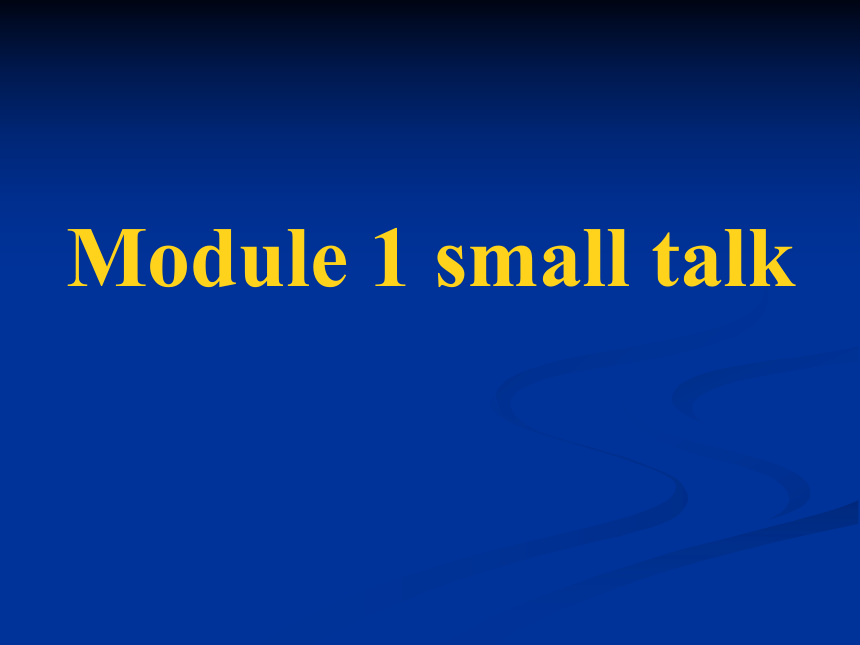
|
|
| 格式 | rar | ||
| 文件大小 | 632.6KB | ||
| 资源类型 | 教案 | ||
| 版本资源 | 外研版 | ||
| 科目 | 英语 | ||
| 更新时间 | 2008-12-09 00:00:00 | ||
图片预览

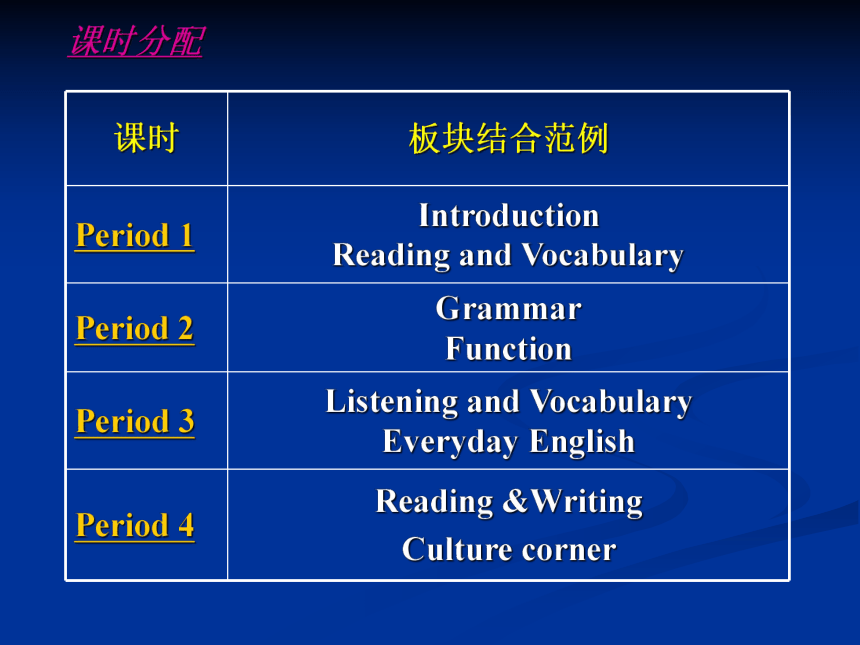
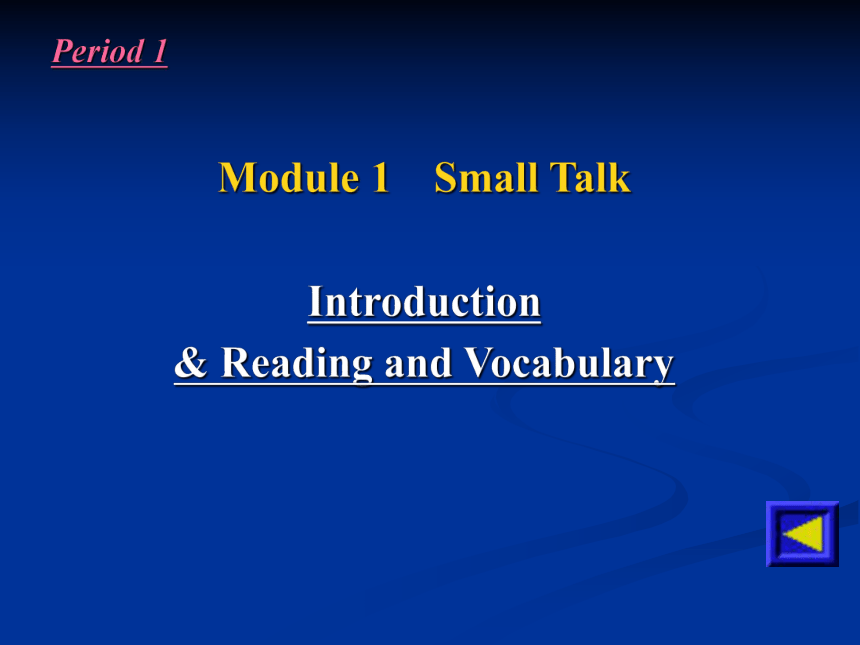
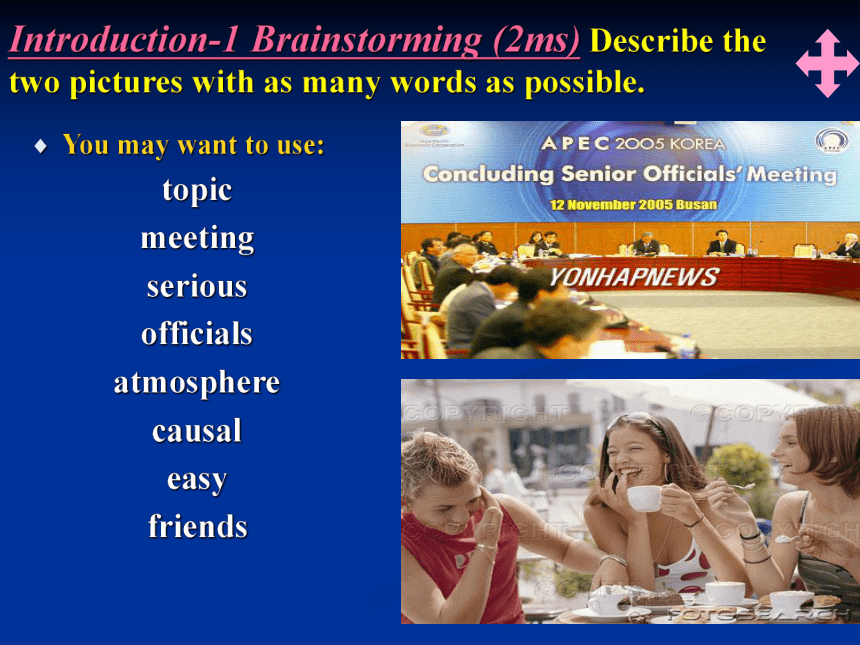
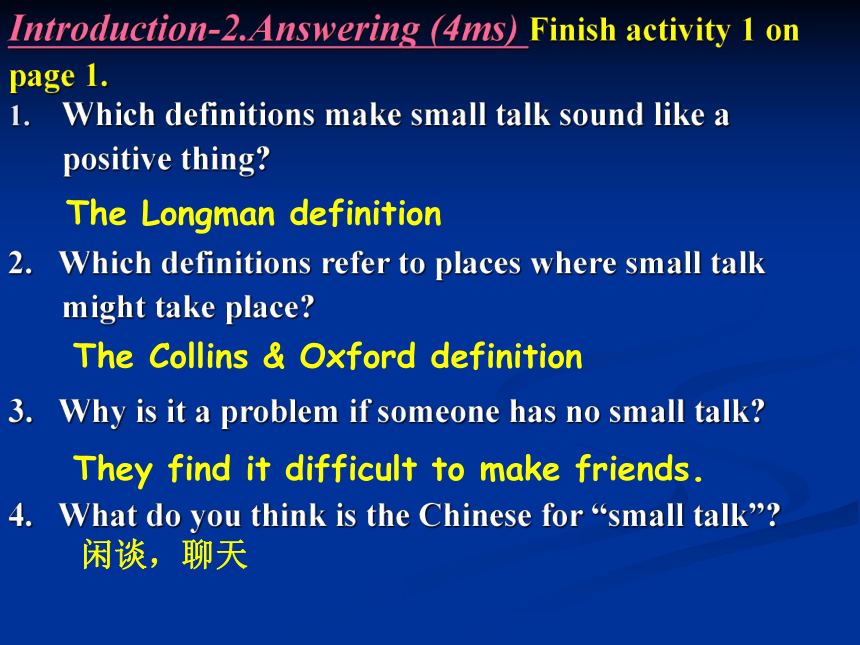
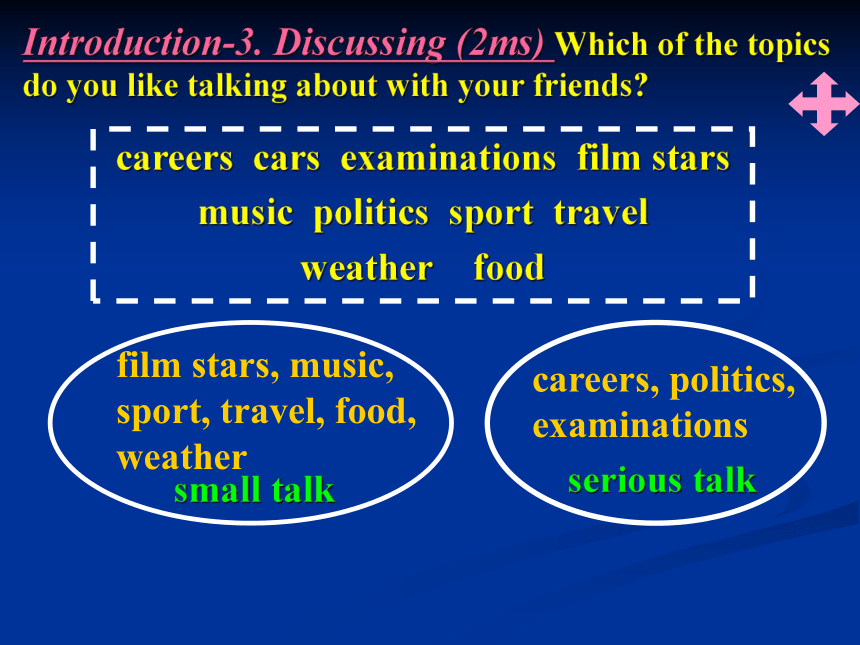
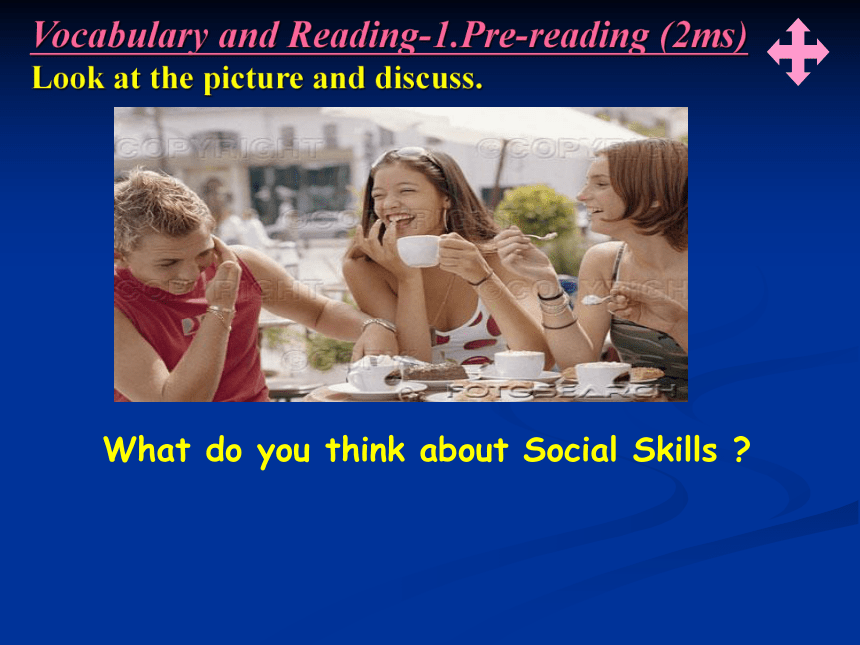

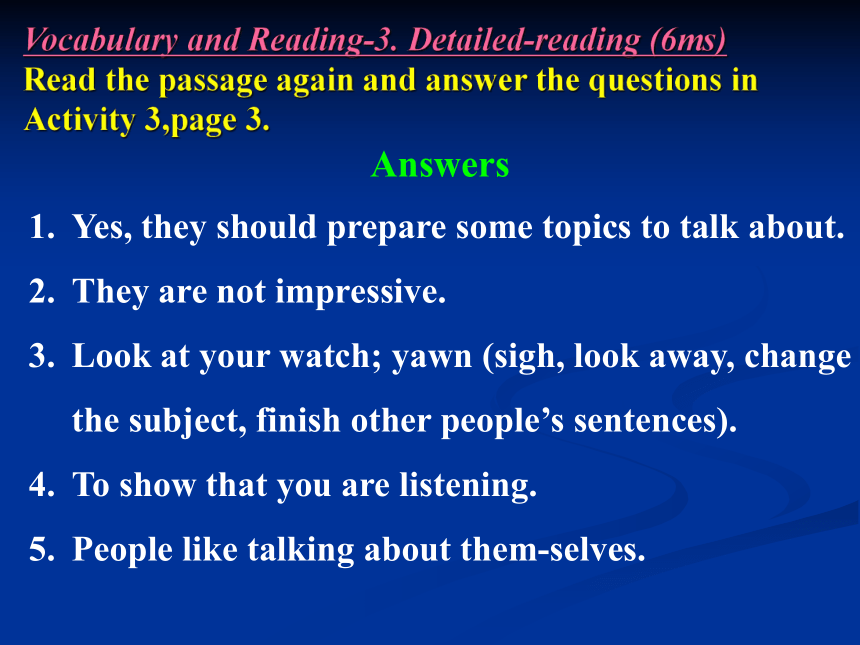
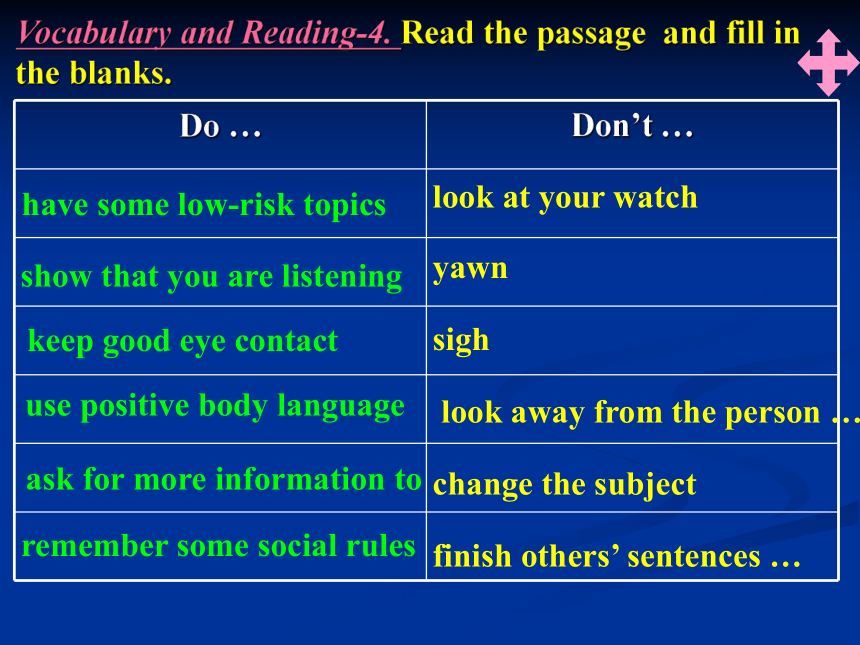
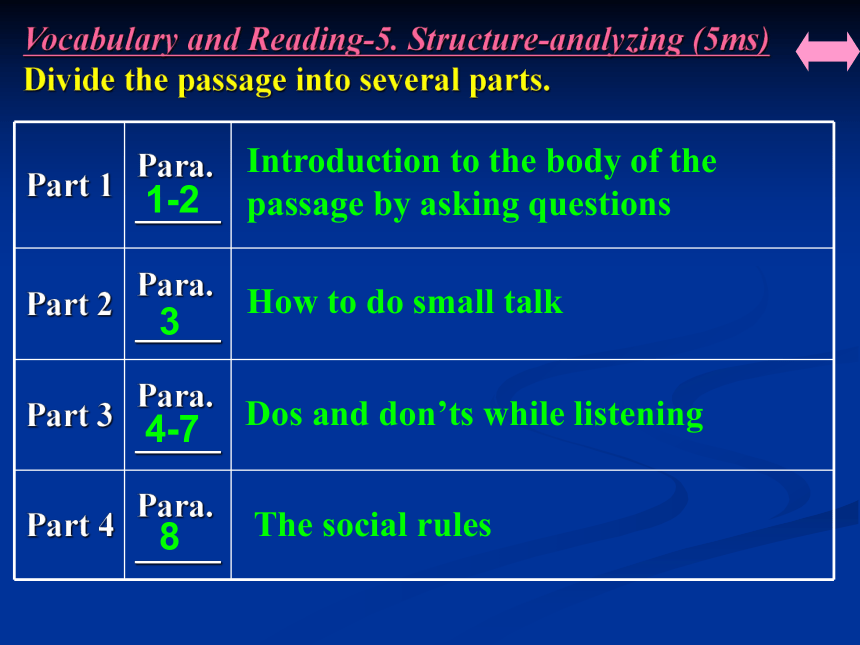
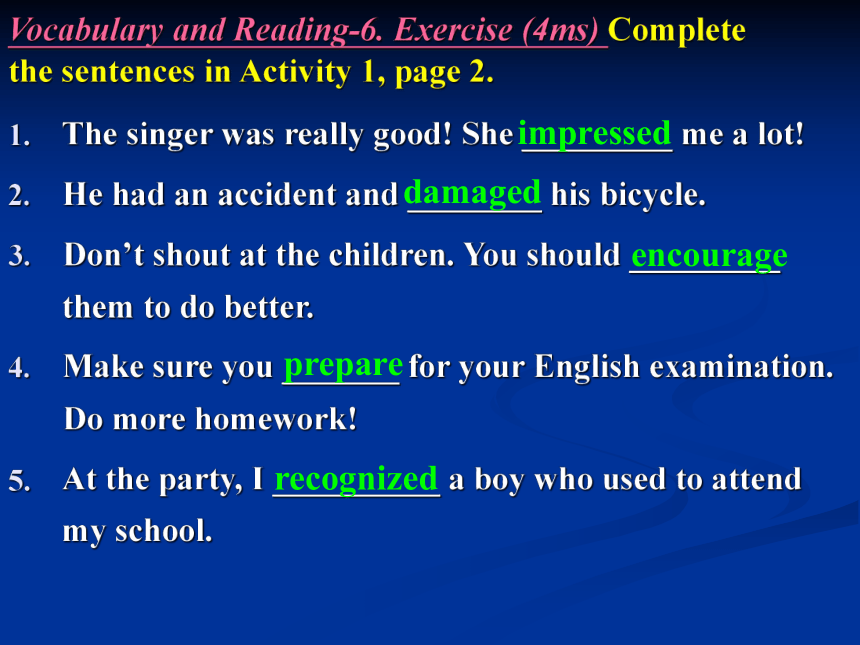
文档简介
课件59张PPT。Module 1 small talk课时分配Period 1Module 1 Small Talk
Introduction
& Reading and VocabularyIntroduction-1 Brainstorming (2ms) Describe the two pictures with as many words as possible.You may want to use:
topic
meeting
serious
officials
atmosphere
causal
easy
friendsIntroduction-2.Answering (4ms) Finish activity 1 on page 1. Which definitions make small talk sound like a positive thing?
2. Which definitions refer to places where small talk might take place?
3. Why is it a problem if someone has no small talk?
4. What do you think is the Chinese for “small talk”?The Longman definitionThe Collins & Oxford definitionThey find it difficult to make friends.闲谈,聊天Introduction-3. Discussing (2ms) Which of the topics do you like talking about with your friends?careers cars examinations film stars
music politics sport travel
weather foodfilm stars, music, sport, travel, food, weathercareers, politics, examinations small talkserious talkVocabulary and Reading-1.Pre-reading (2ms) Look at the picture and discuss. What do you think about Social Skills ? Vocabulary and Reading-2. Skimming (3ms) Read the passage and decide what kind of book it is from. Choose from the list. an English teaching book
a business course
a book which tells you what to do at social events
a book to help you prepare for a speaking examinationVocabulary and Reading-3. Detailed-reading (6ms) Read the passage again and answer the questions in Activity 3,page 3.Answers
Yes, they should prepare some topics to talk about.
They are not impressive.
Look at your watch; yawn (sigh, look away, change the subject, finish other people’s sentences).
To show that you are listening.
People like talking about them-selves.Vocabulary and Reading-4. Read the passage and fill in the blanks.look at your watch
yawn
sigh
look away from the person …
change the subject
finish others’ sentences …have some low-risk topicsshow that you are listeningkeep good eye contactuse positive body languageask for more information toremember some social rulesVocabulary and Reading-5. Structure-analyzing (5ms) Divide the passage into several parts. 1-234-78Introduction to the body of the passage by asking questionsHow to do small talkThe social rulesDos and don’ts while listeningVocabulary and Reading-6. Exercise (4ms) Complete the sentences in Activity 1, page 2. The singer was really good! She _________ me a lot!
He had an accident and ________ his bicycle.
Don’t shout at the children. You should _________ them to do better.
Make sure you _______ for your English examination. Do more homework!
At the party, I __________ a boy who used to attend my school.impresseddamagedencouragepreparerecognizedVocabulary and Reading-7. Exercise (4ms) Complete the sentences in Activity 4, page 3.Answers:
avoid
lack
nodded
yawned
sighed
smiledVocabulary and Reading-8. Exercise (4ms) finish the exercise in Activity 5, page 4. Answers:
No, it doesn’t .
You could find out what the social conventions are
about arriving , leaving and bringing gifts.
“Did you watch the Cup Final last Saturday” or “
Have you seen the new James Bones film ?”
Smiling, nodding, saying “yes” and “Oh, really?”etc.
Facing the person who is speaking and making eye
contact.
6. No, they aren’t . Vocabulary and Reading-9. Post-reading (4ms) Discuss your opinion about the following.Which of the ideas in the reading passage do you think
are useful in your society?
Are there any conventions techniques that you think
you will use in the future ?
Which of the listening skills are you good at?
Which of the social skills do you need to improve?
What are some of the usual small talk topics in China?Homework Try to search more social skills of other countries form Internet,
and share with yours classmates tomorrow.
Period 2Module1 Small Talk
Grammar
FunctionFunction-1 Brainstorming (3ms) Discussion
As a student of Senior Two,what do you think:
students have to do at school?
you must do at school?
you musn’t do at school?Function-2 Exercise(4ms) Finish the exercise in the Activity 1, page 4.Answers:
A
B
A
Function-3 Exercise(4ms) Finish the exercise in the Activity 3, page 5.Answers:
A
B
Function-4 Exercise(4ms) Finish the exercise in the Activity 4, page 5. Answers:
must/can/should not
don’t have to / need to
must/ have to
do , have to /need to
don’t have to /don’t need toGrammar-1. Discussion (3ms) Look at the picture below and share your ideas.You needn’t have run so quickly. Why did the man say it?
The other man was running too quickly.
The other man was running too slowly.
The other man was running quickly and
it wasn’t necessary.Grammar-2. Observation (3ms) Look at the sentences below, then find out the differences between them.You didn’t need to speak slowly.
You needn’t have spoken so slowly. didn’t need to do
表示那件事不必做而且实际上那件事的确没做。
needn’t have done
表示虽然那件事不必做但实际上却做了。Grammar-3. Exercise (5ms) Finish the exercise of Activity 2, page 6. Answers:
You needn’t have brought some flowers.
You needn’t have tidied the room.
You needn’t have bought the box of chocolates.
You needn’t have gone to school.
You needn’t have brought the book to show me.Grammar-4. Exercise (5ms) Finish the exercise of Activity 4, page 6. Answers:
needn’t have brought
didn’t need to translate
didn’t need to wait
needn’t have arrived
needn’t have toldGrammar-5. Guessing (3ms) Do you know them?can/could have done sth.
can’t/couldn’t have done sth.
must have done sth.
may/might have done sth.
should have done sth.
shouldn’t have done sth.
ought to have done
ought not to have done可能做了…
不可能做了…
一定做了…
可能做了…
应该做而没有做…
本不该做而做了…
应该做又没有做…
不应该做却做了…Grammar-6. Practice (10 ms) 1.I have lost one of my gloves. I ____ it somewhere.
A. must drop B. must have dropped
C. must be dropping D. must have been dropped
2. Oh, I’m not feeling well in the stomach. I _____ so much fried chicken just now.
A. shouldn’t eat B. mustn’t have eaten
C. shouldn’t have eaten D. mustn’t eat3. Mr. White _______ at 8:30 for the meeting, but he didn’t show up.
A. should have arrived B. should arrive
C. should have had arrived D. should be arriving
4. It was really very dangerous; You ___ him seriously.
A. might have injured B. should have injured
C. must injure D. need have injured5. Why didn’t you make me a telephone call
yesterday? I _______ about it.
A. ought to tell B. ought to have been told
C. might have told D. might have been told
6. It is not like Jack to be unfriendly, so he ___
you when you called.
A. mustn’t have seen B. should not have seen
C. couldn’t have seen D. need not have seen7. --Look, John’s fallen sleep.
--Oh, he _______ too late last night.
A. might sit up B. should have sat up
C. could sit up D. must have sat up
8. --John walked straight into a wall.
--He _____ where he was going.
A. can’t have looked
B. mustn’t have looked
C. couldn’t have been looking
D. mightn’t have been looking Homework Finish WB exercises 1,2 and 3 on Page 91, 92
Period 3Module1 Small Talk
Listening and Speaking
Everyday EnglishListening&Speaking–1. Pre-listening (4ms) Read and match the conversations with the places. Conversation 1
Conversation 2
Conversation 3On a boat
During a job interview
At a summer school
Listening&Speaking–2.Answering (4ms) Answer the questions about the conversations in Activity 2, page 6.Answers:
No, they aren’t.
1&3
B & C Listening & Speaking–3. Listening (5ms) Listen and answer the questions.1. Do the people both speak English as a first language?
2. Did the woman have problems understanding what the man was saying?
3.How did the man help her to understand him better?
4.Why did the woman say that the man needn’t have spoken so slowly?No, they don’t.Yes, she did.He spoke slowly and repeated things.Because she needed a few seconds to get used to his voice.Listening and Speaking–.4 Filling (6m) Choose the correct endings to the lines from the conversation in Activity 4, page 6.Sorry, I couldn’t hear what you said.
I didn’t catch what you said.
Could you repeat what you said?
You needn’t have spoken so slowly.
I just needed a few seconds to get used to your voice.Everyday English–5.Completing (10ms) Make complete sentences.M: Wonderful, aren’t they?
F: Er… I’m sorry?
M: The cliffs.
F: Oh, yes, they are.
M: Been here before?
F: Pardon?
M: I said: Have you been to England before?
F: Sorry, I couldn’t hear what you said. No, this is my
first visit.They’re wonderful, aren’t they?Have you been here before?M: You must be very excited.
F: Yes, I am. Very excited.
M: Staying long?
F: I’m really sorry. I didn’t catch what you said.
M: Sorry, my fault. I said: Are you going to stay in England for a long time?
F: Oh. No. just three weeks.
M: Language course?
F: Yes.
M: Going to anywhere nice?
F: I’m going to study in Oxford.
M: Oxford.Are you staying long?Are you taking a language course?Are you going anywhere nice?F: Yes.
M: Lovely place. Go there a lot.
F: Sorry? Could you repeat what you said?
M: I go there a lot.
F: Oh.
M: Well, have a good time.
F: Thank you. Er… excuse me?
M: Yes?
F: You needn’t have spoken so slowly. I just
needed a few seconds to get used to your voice.
M: Oh.
F: So it wouldn’t have been a problem.It’s a lovely place. I go there a lot.Homework Try to make an informal conversation with your partner and share with yours classmates tomorrow.
Period 4Module 1 Small Talk
Reading &Writing
Culture corner Culture Corner–1. Brainstorming (3ms)Do you know how to make a small talk? Culture Corner–2. Answering (5ms ) Read the passage and answer the questions.What does the AAA mean?
How does the AAA model work?
Is the AAA model a good idea while making small talk with someone you don’t know in China?AAA stands for answer, add and ask.The speakers answer the question, add a piece of information, and then ask a question.openCulture Corner–3. Role-play (5ms ) Make a conversation in the following circumstances by using the AAA model. 1. asking the teacher for help and advice
2. greeting a teenager / stranger
3. talking with a foreignerReading & Writing –1.Answering (2m) Read the e-mail and answer the questions.What’s the main purpose of this email?
Can you find out the questions Alex has?Alex wants to ask for some advice. He needs to know what he can talk about with the Chinese people he meets.Are there any questions that you shouldn’t ask people in China?
What sort of things do Chinese teenagers like talking about?
What sort of things do they find boring? Reading & Writing –2 .Discussion (5ms)
Are there any questions that you shouldn’t ask people in China?
What sort of things do Chinese teenagers like talking about?
What sort of things do they find boring? Reading & Writing –4 .Writing (10ms) try to write a reply. Answer the main questions and offer other advice.
Sentences you may use
Very nice to hear from you.
Thank you for your interesting email.
How are you ? It’s long time since I heard from you.
I hope this information has been useful.
Best of luck at the Chinese Embassy.
Looking forward to hearing from you again soon.Reading & Writing –5 . Peer checking and rewriting (5ms) Read your writing to your partner. Check and rewrite your writing according to the following. Then share it with the whole class.
Do you know the writer’s attitude and emotion?
Are there any good connecting words or phrases?
Are there any good phrases or sentences?
Are there any spelling mistakes? Homework
Try to make a list with your group members about the expression that you need during the English class, in the following circumstances:
Asking the teachers for help and advice
Working in the small group
Apologizing and explaining
Language Date Bank
for ReadingWordsabsence, acquaintance, advance, anniversary,
anyhow, apologise, apology, application,
awkward, brunch, cautious, certain,
circumstance, clerk, coincidence, confidently,
contradict, customer, divorce, embassy, favour,
fax, firm, fool, form, fun_ction, impolite, informal,
interrupt, lack, mature, messy, modest, motto,
nod, outspoken, pregnant, prize, psychologist,
purpose, reception, reply, saleswoman, serious,
shortcoming, sigh, successful, systematic, tease,
tidy, typist, violate, visa, yawnPhrasesas a consequence,
(be) aware of,
(be) nervous about,
body language,
cheer sb. up,
find out,
human being, in addition,
leave out,
look away from,
make friends,
put one’s foot in one’s mouth Sentences to learn Have you ever crossed the road to avoid talking to
someone you recognize?
你是否曾经故意过马路以避免和别人说话。
avoid + doing sth.
翻译:
你下次最好不要犯同样的错误。
You’d better avoid making the same mistakes next
time.
Sentences to learn 2. And are you nervous about the idea of being at a social
event in another country?
想想在另外一个国家参加社交活动时你会紧张么?
be nervous about sth. :因---而紧张
翻译:
当我站在讲台时,真是有点紧张。
When I stand on the platform , I am a bit nervous about
it.
Sentences to learn 3. Small talk is very important and prepares you for more
serious conversations.
闲谈很重要,你可以通过它为严肃话题作准备。
prepare sb. for sth.: 使---为---做准备
翻译:
1.老师准备考试(题目)。
2.老师指导学生准备考试。
Teachers are preparing the exams.Teachers are preparing the students
for the exams. Sentences to learn 4. Keep good eye contact.
保持一个良好的眼神交流。
keep contact with sb.: 和---保持联系,交流
翻译:
从上次见面后,我们就没有保持联系了。
I don’t keep contact with him since we met last time. Sentences to learn 5. I have a favour to ask.
我想请你帮个忙。
ask a favour :请帮个忙
翻译:
我想请你帮个忙。请把自行车借给我好么?
I want to ask a favour of you; will you lend me your
bicycle.Translation你是否愿意参加聚会并自信地和每位来宾交谈。
Would you love to go to a party and talk confidently to every guest?
你是否想结交更多的朋友但又缺乏与陌生人交谈的信心?
Do you want to make more friends but lack the confidence to talk to people you don’t know?
准备好几句不太会出错的开场白。
Have some low-risk conversation openers ready.Translation交流是双向的过程—它涉及说和听两个方面。
Communication is a two-way process – it involves speaking and listening.
要永远记住—话太多并不会给人留下怎样的印象。
Always remember – you won’t impress people if you talk too much.
Introduction
& Reading and VocabularyIntroduction-1 Brainstorming (2ms) Describe the two pictures with as many words as possible.You may want to use:
topic
meeting
serious
officials
atmosphere
causal
easy
friendsIntroduction-2.Answering (4ms) Finish activity 1 on page 1. Which definitions make small talk sound like a positive thing?
2. Which definitions refer to places where small talk might take place?
3. Why is it a problem if someone has no small talk?
4. What do you think is the Chinese for “small talk”?The Longman definitionThe Collins & Oxford definitionThey find it difficult to make friends.闲谈,聊天Introduction-3. Discussing (2ms) Which of the topics do you like talking about with your friends?careers cars examinations film stars
music politics sport travel
weather foodfilm stars, music, sport, travel, food, weathercareers, politics, examinations small talkserious talkVocabulary and Reading-1.Pre-reading (2ms) Look at the picture and discuss. What do you think about Social Skills ? Vocabulary and Reading-2. Skimming (3ms) Read the passage and decide what kind of book it is from. Choose from the list. an English teaching book
a business course
a book which tells you what to do at social events
a book to help you prepare for a speaking examinationVocabulary and Reading-3. Detailed-reading (6ms) Read the passage again and answer the questions in Activity 3,page 3.Answers
Yes, they should prepare some topics to talk about.
They are not impressive.
Look at your watch; yawn (sigh, look away, change the subject, finish other people’s sentences).
To show that you are listening.
People like talking about them-selves.Vocabulary and Reading-4. Read the passage and fill in the blanks.look at your watch
yawn
sigh
look away from the person …
change the subject
finish others’ sentences …have some low-risk topicsshow that you are listeningkeep good eye contactuse positive body languageask for more information toremember some social rulesVocabulary and Reading-5. Structure-analyzing (5ms) Divide the passage into several parts. 1-234-78Introduction to the body of the passage by asking questionsHow to do small talkThe social rulesDos and don’ts while listeningVocabulary and Reading-6. Exercise (4ms) Complete the sentences in Activity 1, page 2. The singer was really good! She _________ me a lot!
He had an accident and ________ his bicycle.
Don’t shout at the children. You should _________ them to do better.
Make sure you _______ for your English examination. Do more homework!
At the party, I __________ a boy who used to attend my school.impresseddamagedencouragepreparerecognizedVocabulary and Reading-7. Exercise (4ms) Complete the sentences in Activity 4, page 3.Answers:
avoid
lack
nodded
yawned
sighed
smiledVocabulary and Reading-8. Exercise (4ms) finish the exercise in Activity 5, page 4. Answers:
No, it doesn’t .
You could find out what the social conventions are
about arriving , leaving and bringing gifts.
“Did you watch the Cup Final last Saturday” or “
Have you seen the new James Bones film ?”
Smiling, nodding, saying “yes” and “Oh, really?”etc.
Facing the person who is speaking and making eye
contact.
6. No, they aren’t . Vocabulary and Reading-9. Post-reading (4ms) Discuss your opinion about the following.Which of the ideas in the reading passage do you think
are useful in your society?
Are there any conventions techniques that you think
you will use in the future ?
Which of the listening skills are you good at?
Which of the social skills do you need to improve?
What are some of the usual small talk topics in China?Homework Try to search more social skills of other countries form Internet,
and share with yours classmates tomorrow.
Period 2Module1 Small Talk
Grammar
FunctionFunction-1 Brainstorming (3ms) Discussion
As a student of Senior Two,what do you think:
students have to do at school?
you must do at school?
you musn’t do at school?Function-2 Exercise(4ms) Finish the exercise in the Activity 1, page 4.Answers:
A
B
A
Function-3 Exercise(4ms) Finish the exercise in the Activity 3, page 5.Answers:
A
B
Function-4 Exercise(4ms) Finish the exercise in the Activity 4, page 5. Answers:
must/can/should not
don’t have to / need to
must/ have to
do , have to /need to
don’t have to /don’t need toGrammar-1. Discussion (3ms) Look at the picture below and share your ideas.You needn’t have run so quickly. Why did the man say it?
The other man was running too quickly.
The other man was running too slowly.
The other man was running quickly and
it wasn’t necessary.Grammar-2. Observation (3ms) Look at the sentences below, then find out the differences between them.You didn’t need to speak slowly.
You needn’t have spoken so slowly. didn’t need to do
表示那件事不必做而且实际上那件事的确没做。
needn’t have done
表示虽然那件事不必做但实际上却做了。Grammar-3. Exercise (5ms) Finish the exercise of Activity 2, page 6. Answers:
You needn’t have brought some flowers.
You needn’t have tidied the room.
You needn’t have bought the box of chocolates.
You needn’t have gone to school.
You needn’t have brought the book to show me.Grammar-4. Exercise (5ms) Finish the exercise of Activity 4, page 6. Answers:
needn’t have brought
didn’t need to translate
didn’t need to wait
needn’t have arrived
needn’t have toldGrammar-5. Guessing (3ms) Do you know them?can/could have done sth.
can’t/couldn’t have done sth.
must have done sth.
may/might have done sth.
should have done sth.
shouldn’t have done sth.
ought to have done
ought not to have done可能做了…
不可能做了…
一定做了…
可能做了…
应该做而没有做…
本不该做而做了…
应该做又没有做…
不应该做却做了…Grammar-6. Practice (10 ms) 1.I have lost one of my gloves. I ____ it somewhere.
A. must drop B. must have dropped
C. must be dropping D. must have been dropped
2. Oh, I’m not feeling well in the stomach. I _____ so much fried chicken just now.
A. shouldn’t eat B. mustn’t have eaten
C. shouldn’t have eaten D. mustn’t eat3. Mr. White _______ at 8:30 for the meeting, but he didn’t show up.
A. should have arrived B. should arrive
C. should have had arrived D. should be arriving
4. It was really very dangerous; You ___ him seriously.
A. might have injured B. should have injured
C. must injure D. need have injured5. Why didn’t you make me a telephone call
yesterday? I _______ about it.
A. ought to tell B. ought to have been told
C. might have told D. might have been told
6. It is not like Jack to be unfriendly, so he ___
you when you called.
A. mustn’t have seen B. should not have seen
C. couldn’t have seen D. need not have seen7. --Look, John’s fallen sleep.
--Oh, he _______ too late last night.
A. might sit up B. should have sat up
C. could sit up D. must have sat up
8. --John walked straight into a wall.
--He _____ where he was going.
A. can’t have looked
B. mustn’t have looked
C. couldn’t have been looking
D. mightn’t have been looking Homework Finish WB exercises 1,2 and 3 on Page 91, 92
Period 3Module1 Small Talk
Listening and Speaking
Everyday EnglishListening&Speaking–1. Pre-listening (4ms) Read and match the conversations with the places. Conversation 1
Conversation 2
Conversation 3On a boat
During a job interview
At a summer school
Listening&Speaking–2.Answering (4ms) Answer the questions about the conversations in Activity 2, page 6.Answers:
No, they aren’t.
1&3
B & C Listening & Speaking–3. Listening (5ms) Listen and answer the questions.1. Do the people both speak English as a first language?
2. Did the woman have problems understanding what the man was saying?
3.How did the man help her to understand him better?
4.Why did the woman say that the man needn’t have spoken so slowly?No, they don’t.Yes, she did.He spoke slowly and repeated things.Because she needed a few seconds to get used to his voice.Listening and Speaking–.4 Filling (6m) Choose the correct endings to the lines from the conversation in Activity 4, page 6.Sorry, I couldn’t hear what you said.
I didn’t catch what you said.
Could you repeat what you said?
You needn’t have spoken so slowly.
I just needed a few seconds to get used to your voice.Everyday English–5.Completing (10ms) Make complete sentences.M: Wonderful, aren’t they?
F: Er… I’m sorry?
M: The cliffs.
F: Oh, yes, they are.
M: Been here before?
F: Pardon?
M: I said: Have you been to England before?
F: Sorry, I couldn’t hear what you said. No, this is my
first visit.They’re wonderful, aren’t they?Have you been here before?M: You must be very excited.
F: Yes, I am. Very excited.
M: Staying long?
F: I’m really sorry. I didn’t catch what you said.
M: Sorry, my fault. I said: Are you going to stay in England for a long time?
F: Oh. No. just three weeks.
M: Language course?
F: Yes.
M: Going to anywhere nice?
F: I’m going to study in Oxford.
M: Oxford.Are you staying long?Are you taking a language course?Are you going anywhere nice?F: Yes.
M: Lovely place. Go there a lot.
F: Sorry? Could you repeat what you said?
M: I go there a lot.
F: Oh.
M: Well, have a good time.
F: Thank you. Er… excuse me?
M: Yes?
F: You needn’t have spoken so slowly. I just
needed a few seconds to get used to your voice.
M: Oh.
F: So it wouldn’t have been a problem.It’s a lovely place. I go there a lot.Homework Try to make an informal conversation with your partner and share with yours classmates tomorrow.
Period 4Module 1 Small Talk
Reading &Writing
Culture corner Culture Corner–1. Brainstorming (3ms)Do you know how to make a small talk? Culture Corner–2. Answering (5ms ) Read the passage and answer the questions.What does the AAA mean?
How does the AAA model work?
Is the AAA model a good idea while making small talk with someone you don’t know in China?AAA stands for answer, add and ask.The speakers answer the question, add a piece of information, and then ask a question.openCulture Corner–3. Role-play (5ms ) Make a conversation in the following circumstances by using the AAA model. 1. asking the teacher for help and advice
2. greeting a teenager / stranger
3. talking with a foreignerReading & Writing –1.Answering (2m) Read the e-mail and answer the questions.What’s the main purpose of this email?
Can you find out the questions Alex has?Alex wants to ask for some advice. He needs to know what he can talk about with the Chinese people he meets.Are there any questions that you shouldn’t ask people in China?
What sort of things do Chinese teenagers like talking about?
What sort of things do they find boring? Reading & Writing –2 .Discussion (5ms)
Are there any questions that you shouldn’t ask people in China?
What sort of things do Chinese teenagers like talking about?
What sort of things do they find boring? Reading & Writing –4 .Writing (10ms) try to write a reply. Answer the main questions and offer other advice.
Sentences you may use
Very nice to hear from you.
Thank you for your interesting email.
How are you ? It’s long time since I heard from you.
I hope this information has been useful.
Best of luck at the Chinese Embassy.
Looking forward to hearing from you again soon.Reading & Writing –5 . Peer checking and rewriting (5ms) Read your writing to your partner. Check and rewrite your writing according to the following. Then share it with the whole class.
Do you know the writer’s attitude and emotion?
Are there any good connecting words or phrases?
Are there any good phrases or sentences?
Are there any spelling mistakes? Homework
Try to make a list with your group members about the expression that you need during the English class, in the following circumstances:
Asking the teachers for help and advice
Working in the small group
Apologizing and explaining
Language Date Bank
for ReadingWordsabsence, acquaintance, advance, anniversary,
anyhow, apologise, apology, application,
awkward, brunch, cautious, certain,
circumstance, clerk, coincidence, confidently,
contradict, customer, divorce, embassy, favour,
fax, firm, fool, form, fun_ction, impolite, informal,
interrupt, lack, mature, messy, modest, motto,
nod, outspoken, pregnant, prize, psychologist,
purpose, reception, reply, saleswoman, serious,
shortcoming, sigh, successful, systematic, tease,
tidy, typist, violate, visa, yawnPhrasesas a consequence,
(be) aware of,
(be) nervous about,
body language,
cheer sb. up,
find out,
human being, in addition,
leave out,
look away from,
make friends,
put one’s foot in one’s mouth Sentences to learn Have you ever crossed the road to avoid talking to
someone you recognize?
你是否曾经故意过马路以避免和别人说话。
avoid + doing sth.
翻译:
你下次最好不要犯同样的错误。
You’d better avoid making the same mistakes next
time.
Sentences to learn 2. And are you nervous about the idea of being at a social
event in another country?
想想在另外一个国家参加社交活动时你会紧张么?
be nervous about sth. :因---而紧张
翻译:
当我站在讲台时,真是有点紧张。
When I stand on the platform , I am a bit nervous about
it.
Sentences to learn 3. Small talk is very important and prepares you for more
serious conversations.
闲谈很重要,你可以通过它为严肃话题作准备。
prepare sb. for sth.: 使---为---做准备
翻译:
1.老师准备考试(题目)。
2.老师指导学生准备考试。
Teachers are preparing the exams.Teachers are preparing the students
for the exams. Sentences to learn 4. Keep good eye contact.
保持一个良好的眼神交流。
keep contact with sb.: 和---保持联系,交流
翻译:
从上次见面后,我们就没有保持联系了。
I don’t keep contact with him since we met last time. Sentences to learn 5. I have a favour to ask.
我想请你帮个忙。
ask a favour :请帮个忙
翻译:
我想请你帮个忙。请把自行车借给我好么?
I want to ask a favour of you; will you lend me your
bicycle.Translation你是否愿意参加聚会并自信地和每位来宾交谈。
Would you love to go to a party and talk confidently to every guest?
你是否想结交更多的朋友但又缺乏与陌生人交谈的信心?
Do you want to make more friends but lack the confidence to talk to people you don’t know?
准备好几句不太会出错的开场白。
Have some low-risk conversation openers ready.Translation交流是双向的过程—它涉及说和听两个方面。
Communication is a two-way process – it involves speaking and listening.
要永远记住—话太多并不会给人留下怎样的印象。
Always remember – you won’t impress people if you talk too much.
